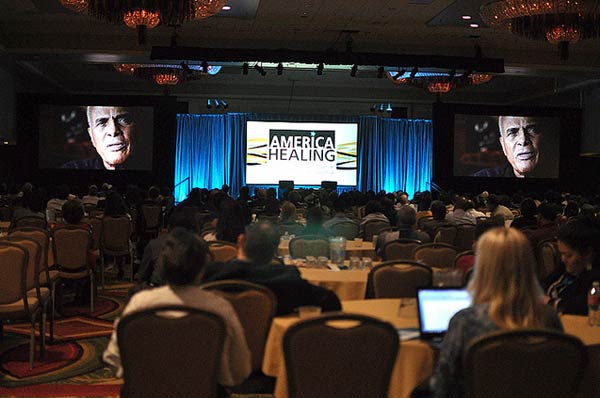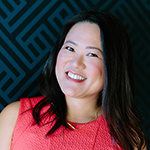
American Healing conference in New Orleans, April 25, 2012, image courtesy of W.K. Kellogg Foundation
Last week, I spent four days in a New Orleans conference hall listentening to race work luminaries, including Harry Belafonte, Maria Hinojosa, Donna Brazile, Benjamin Jealous, and Melissa Harris-Perry. Over 500 of the nation’s leaders in racial equity work were there for the second annual America Healing convening, held by the W.K. Kellogg Foundation. I was invited to attend the event by the Kellogg Foundation, which has committed 75 million dollars over a five-year period to initiatives designed to address structural inequities in the United States.
The goals of the program are two-fold: to support programs that promote racial equity (systemic policies) and to encourage racial healing (what we believe about ourselves because of our race).
Yet, as I listened to stories about the history of structural racism that dates back to slavery in the American colonies and extends to the present day top-of-mind issues like the Trayvon Martin case, I felt a little bit overwhelmed. I also struggled internally to process how Asian Americans fit in this dialogue. Statistically, Asians are a smaller demographic group than blacks or Hispanics, and popular media sometimes has a tendency to lump us in with whites — when it is convenient. But Asians are the fastest growing group of Americans, nearly 15 million in total. And Asian Americans were represented at America Healing: professors and priests, filmmakers and administrators.
So, you may be thinking that all this talk about race is great for the journalists, politicians and activists out there, but for regular moms — or dads — trying to keep the kids clothed and fed, there just isn’t time or energy for this kind of stuff. Perhaps you don’t know what role Asians (or even a white person married to an Asian Pacific Islander) play in our society.
Well, here are some of the takeaways from America Healing that any of us can use in our daily lives.
Vote!
One of the most fundamental ways we can be active in our government is by using a right that’s granted to every American citizen — the right to vote. Yet, did you know that one in four Americans who are eligible to vote are not registered? According to the Census Bureau, less than half of Asian Americans voted in the 2008 election, and less than 25% received information about elections.
So exercise your right to vote, get your friends and family to vote, and if you have time, volunteer to help get the word out.
Make our voices heard
Several times during the conference, I heard a sub-current, especially among the Asian and Native Americans present, that our experiences are not acknowledged by the mainstream. Or perhaps they are reported inaccurately or in a biased manner. This sentiment was especially palpable during a breakout session about immigration. How many times have you heard this rhetoric in discussion about immigrants (or just ethnic groups which have more recently established themselves in the U.S.): Who knows if they’re even citizens? But are they American?
It could be in the context of Mexican immigrants in Arizona, the danger of terrorism or Sharia law brought on by Muslims, or China-bashing under the guise of protecting the U.S. economy . In any case, the root is xenophobia, and it’s pretty easily extended to recent immigrants, as well as people who just look like they might be immigrants.
Deepa Iyer, Executive Director of South Asian Americans Leading Together (SAALT), emphasized the importance of getting our stories in the public consciousness, so people will remember that no matter what our appearance or culture, we all share the common concerns of taking care of our kids, paying our bills and being part of our communities. And it needs to be an ongoing process, not just a reaction to the latest headlines. According to the Pew Research Center, Asians have the highest rates of broadband Internet access, with 80% having access at home. Use that ability to share your narratives through blogging or social media.
In another session about racial bias in the media, Evelyn Hsu from the Maynard Institute for Journalism Education also urged people to call the newspapers or TV stations if they see biased reporting or are quoted out of context.
Collaborate with others
Ever heard of the Oppression Olympics? You know, the kind of thinking that devolves into
Black people have it worst because…
Latinos have it worst because…
Asians have it worst because…
Native Americans have it worst because…
Well, stop it! Rinku Sen of the Applied Research Center, which publishes Colorlines Magazine, put it this way, “The way oppression works does differ from community to community. Immigration systems do affect everybody, not in the same way, but we can’t solve the problem unless we understand the mechanism.” Sen explains that understanding the system will give us empathy to build solidarity with other demographic groups, which will in turn help us to work together to find solutions.
Get to know people who are not like you… racially, politically, religiously
“I do this in order to crystallize my own views and to understand,” says Ralph Everett of the Joint Center for Political and Economic Studies . “This about how many people who you see on a regular basis that you’ve not had in your home who are of a different color or a different religion. That helps a lot with the understanding and the healing process that we are talking about here today.”
During the course of America Healing, I ate meals, listened to speakers and took part in discussions with African Americans, American Indians, Latinos, multiracials, Muslims, Jews, gays and lesbians, as well as a few Asian Americans. And I have a confession to make: it wasn’t always comfortable. The first night of the conference, I looked around a big ballroom and felt like the new kid in the school cafeteria. Carrying my plate of hors d’oeuvres, I quickly scanned the room, looking for a table where I would feel comfortable. I zoomed in on seat near some other middle-ish aged women of varying races.
It’s okay to feel awkward around people of a different race, religion or socio-economic background. Acknowledge that. And then go seek out people who are not like you, anyway!
The W.K. Kellogg Foundation paid for my travel expenses, but the opinions expressed are my own.

These are great suggestions on how to be heard. What an inspiring opportunity to attend that conference!